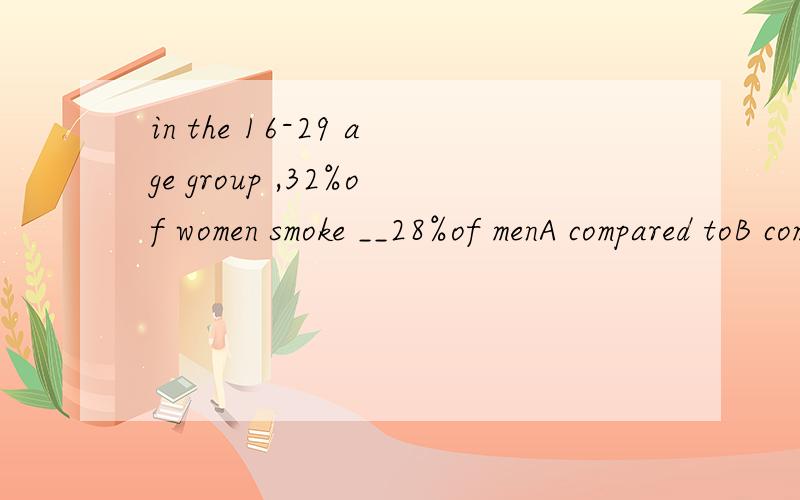in the 16-29 age group ,32%of women smoke __28%of menA compared toB comparing withc comparing to D compared with本来知道这两个短语的区别,一个是把..和..比较,一个是把..比做..,后看了一本书,又搞糊涂了,
来源:学生作业帮助网 编辑:作业帮 时间:2024/11/06 08:01:20

in the 16-29 age group ,32%of women smoke __28%of menA compared toB comparing withc comparing to D compared with本来知道这两个短语的区别,一个是把..和..比较,一个是把..比做..,后看了一本书,又搞糊涂了,
in the 16-29 age group ,32%of women smoke __28%of men
A compared to
B comparing with
c comparing to
D compared with
本来知道这两个短语的区别,一个是把..和..比较,一个是把..比做..,后看了一本书,又搞糊涂了,说的是comepare to 也可表比较,怎么回事啊
in the 16-29 age group ,32%of women smoke __28%of menA compared toB comparing withc comparing to D compared with本来知道这两个短语的区别,一个是把..和..比较,一个是把..比做..,后看了一本书,又搞糊涂了,
compare with与…比较,compare to比喻为
compare...with...把……和……比较(常表示同类相比,比较)
compare...to...把……比作……(常表示异类相比,比喻)
①Let's compare this article with that one.让我们把这篇文章和那篇文章作一下比较.
②The heart is often compared to a pump.心脏常被比作水泵.
compare的过去分词短语形式用作状语时,不管同类还是异类,compared with和compared to都可以用.例:
Compared with/to western countries,China uses materials very carefully.和西方相比,中国使用物资很节省.
In the 16-19 age group,32% of women smoke,compared to/with 28% of men.
在16-19岁年龄组中,与28%的男人相比,有32%的女人抽烟.
如果不看上下文
这里 填 ABCD 四个都对
compare to 和compare with 在大多数句子里,基本上没有曲别
A compares to B - 拿A 去和B 比
A compares with B - A 和B 相比
关键 就在 to 和with 这两个词的不同
例子
adds A to B
adds A with B 同样解释
compared
com·pared / kəm`perd / adjective
compared to/with used for talking about the ways in which two things
are different, or about the ways in which something has changed:
...
全部展开
compared
com·pared / kəm`perd / adjective
compared to/with used for talking about the ways in which two things
are different, or about the ways in which something has changed:
The Ohio branch produced 2000 units per month, compared with a national average of 2400 units per month.
Profits were good compared with last year.
Compared to some of the things she's said, this was polite.
as compared to/with: 25% of school-age children smoke, as compared to 21% of adults.
收起